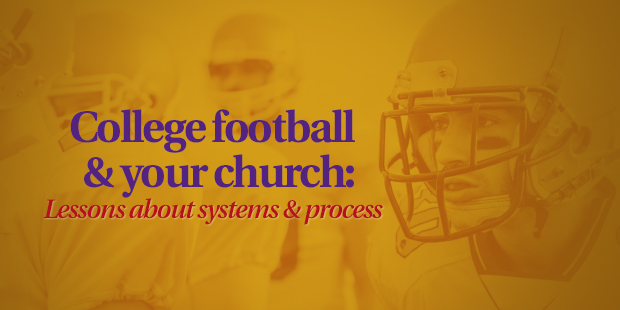Man, I love college football!! It is, by far, my favorite spectator sport. The energy, excitement and yes, even the controversy, is unmatched by any other sport.
As we head into the final weeks of the college football season, there’s going to be a lot of debate about who deserves to be in the National Championship game. Though my loyalties lie with the Georgia Bulldog Nation, I still appreciate the way coaches like Nick Saban (Alabama) and Chip Kelly (Oregon) have lead their teams to get to this point. Have you noticed that their teams are in the top 5 national rankings every year? As you analyze their leadership, there’s one principle that has helped define their success which also has tremendous application in the local church:
The church systems and processes you implement as a leader directly impact the behaviors and outcomes of those you lead.
Goals without defined processes and systems are nothing more than pipe dreams. While focusing on the weekend experience is very important, it’s not enough to engage people in real relationships and authentic community. None of this just happens; there must be a method behind what you want to accomplish.
For example, maybe you want to raise up more leaders and volunteers. But the only system you have in place to accomplish that goal is to make more announcements from the pulpit. That is not a purposeful strategy, and it won’t create more volunteers. Quite simply, it won’t do anything to move the ball down the field.
The best college coaches in the country don’t make it to the National Championship game by focusing solely on some motivational speech they give before each game. They have a detailed strategy, from how they recruit to how they practice to how they create a game plan each week to accomplish their goals.
As church leaders, we must approach our work in the same way. A solid process will actually help us reach our goals by influencing and dictating the behavior of the people who help us get there. Here are a few ways that effective processes impact outcomes:
- Effective Processes set expectations
- Effective Processes offer clarity
- Effective Processes help people self-select or opt out based on their “fit” and “passion”
- Effective Processes equip and train
- Effective Processes identify the right tools to support people.
- Effective Processes evaluate success and offer accountability
Let’s use small group leadership as a practical example. As a small group leader, my end goal is to create and facilitate a healthy small group that is engaging in community and experiencing life change. But you can’t just trust my abilities to make that happen. Church leadership must provide process for me to operate in if they really want to see consistent success.
- Set expectations for me that eliminate ambiguity about what is expected. For example, make sure I know I am expected to turn in individual attendance each week. Be sure I understand why it’s important.
- Train me to be effective. Give me practical tools which help me better facilitate communication and community.
- Support me by telling me where to go if I hit obstacles or situations I am not equipped for.
- Give me tools that help me meet expectations in an easy and efficient manner. Preferably, they are online so I can access them from anywhere.
- Hold me accountable to the health of my group by evaluating results. Good leaders (and I try hard to be one) desire accountability and seek to know how they are doing.
In the end, the process you establish and follow will guide my behavior and help me create a healthy small group.
Inspiration alone will not create the Kingdom impact we desire. Hope is not enough. You must start by creating systems and processes that will help you get wherever it is your feel God is leading you. It may not be perfect at first, but as you begin to implement it, you can identify what’s working, what’s not, and be able to make the adjustments moving forward.
Nick Saban won a National Championship at Alabama in his first season. He did this with the very same players who finished 6-6 the year before. When he was asked how he did it in the post game interviews, he referenced the word PROCESS every single time!!
How have you seen this principle play out in the work you do? What encouraging words would you have for someone looking to create processes that lead the life change?

Tags: Leadership Engine, Process, Steve Caton, Systems
|
What is MyVisionRoom? > | Back to Leadership >





























